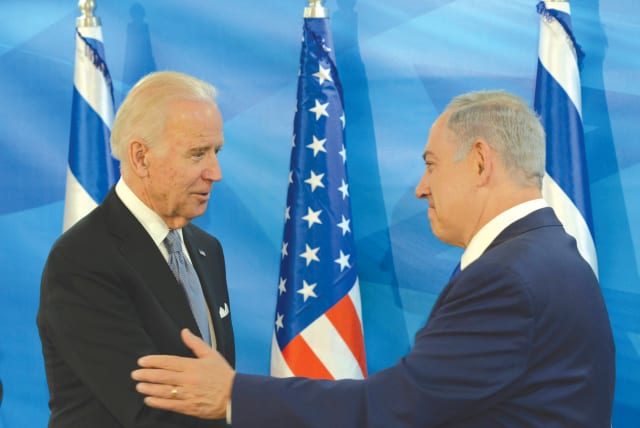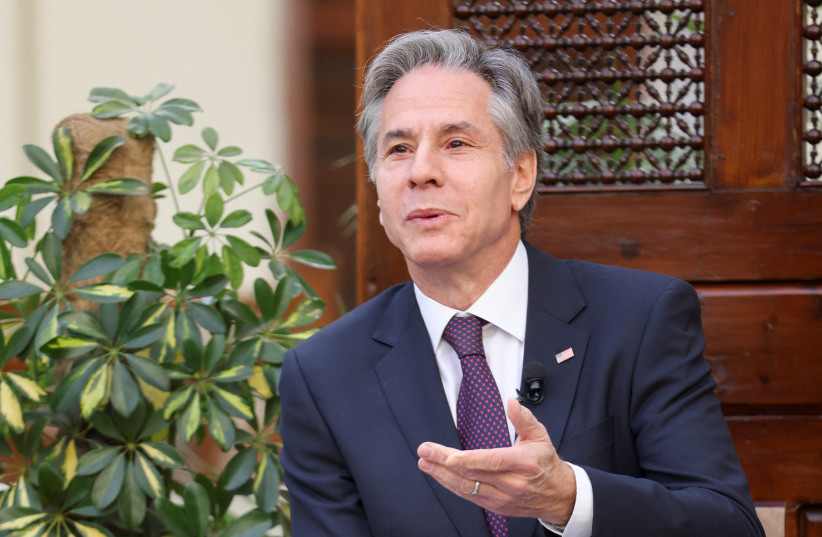Biden, Netanyahu on the same page regarding Iran - opinion

The US Biden administration has expressed its wish to maintain cooperation with Israel on many issues. Iran tops that list.
The recent visit by US National Security Advisor Jake Sullivan, and this past week’s meetings with Secretary of State Antony Blinken, reflect the Biden administration’s wish to cooperate with Israel’s new government on a number of issues, Iran being at the top of the list. As Politico reported, Israel remains an important ally due to its intelligence capabilities and its historical and political resonance in the US.
Another purpose on both agendas was to prepare for Benjamin Netanyahu’s first visit to Washington in his new-old role as Israel’s prime minister. Meetings between American presidents and Israeli prime ministers always require precise preparation to smooth the way toward agreement and in order to remove potential bumps in the talks. It usually, but not always, brings the desired results, significant exceptions were the first and ensuing Netanyahu-Obama meetings.
In addition to the Iranian issue, the meeting with Secretary Blinken, as well as the planned visit to Washington, were also intended to include discussions of what can be called the US-Saudi Arabia-Israel triangle, along with several Palestinian issues and American attempts to keep the “two-state” solution alive.
While the Palestinian matter has no intrinsic connection to the Iranian nuclear issue, Washington could create a not unprecedented “linkage” between Israel’s positions and actions in Judea and Samaria and its own willingness to coordinate positions on Iran. As the Israeli government’s recent decision on an unauthorized new settlement in Samaria shows, the implications of this were understood.
At the same time, one may assume that Netanyahu made it clear to his American interlocutors that Mahmoud Abbas’s Palestinian Authority was largely to blame for increasing Palestinian violence as a result of its ongoing incitement against Israel and its policy of compensating families of dead terrorists. Blinken also had a message for Israel’s opposition, that a consensus was needed on Israel’s planned judicial reform.
Amid a changed geopolitical environment, Israel remains the primary stable US ally in the region
All these meetings were taking place in a changed geopolitical environment both for Israel and the US in matters beyond either party’s control, such as America’s renewed confrontation with Russia over the war in Ukraine and the consequences thereof, including the renewed importance of oil and natural gas from the Middle East, and its strategic and political implications – not the least important of which was the enhancement of Israel as America’s primary stable ally in the region.
This geopolitical reality also gives Israel, resulting from shared concerns about Iran’s regional threats, an opportunity to further expand its ties with Gulf and additional Arab states, plausibly including Saudi Arabia – especially with respect to security, in cooperation with US Central Command.
THE SULLIVAN visit generated a meeting of the Negev Forum composed of the US, Israel, the United Arab Emirates, Bahrain, Egypt and Morocco, dealing with matters of security and water technology – to be followed by what has been described as America’s and Israel’s most significant large-scale military exercise, Juniper Oak.
It was clearly designed to send a warning message to Iran – stressing the close security cooperation between Israel and the US, notwithstanding the attempts of the radical Left in the Democratic party in Congress to undermine this. As The Jerusalem Post’s and Defense News’s Seth Frantzman has pointed out, Israel now being part of the US Central Command dealing with the Middle East, was also facilitated, among other things, by the Abraham Accords.
After the diplomatic passivity of the previous government on the Iranian and other issues, Netanyahu is clearly determined to put the effort against Iran’s nuclear ambitions before other diplomatic issues, having been among the first to identify these, correctly, as an existential threat to Israel. In view of this, his aim is to ascertain as much as possible that the US and Israel are on the same page, which was not always possible during the Obama period.
However, some observers have commented that though the Biden administration is not ignoring the Iranian threat against Israel and other regional states either, nor that against America’s own interests, in contrast to the position of Israel and of most Arab states, it may still be willing to make due for the time being with creating a time-lag for a few years, rather than acting decisively to eliminate it. This would also conform with the overall trend of reducing the American presence in the Middle East and “moving its pivot” to the Far East, notwithstanding the unintended detour to Ukraine.
With regard to the latter, The New York Times has reported that the US had opened its emergency weapons stores in Israel, which based on the prepositioning agreement of the 1980s were, among other things, intended to assist Israel with ammunition in case of an intensive war. It has symbolized the security cooperation between the countries.
But the reported opening of the emergency weapons stores was said to have been carried out in order to transfer hundreds of thousands of shells to Ukraine. As Haaretz noted, this was agreed to by the previous Lapid-Bennett government, though it is unclear whether, as in the case of the maritime agreement with Lebanon, the government had updated the Knesset Foreign Affairs and Defense Committee.
As stated, both the US and Israel have declared that a nuclear Iran is not acceptable. But what does this mean in practical terms? The answer to this is highly significant for Israel and the Arab states.
In Washington, and especially in Europe, there are still voices that would welcome a return to the original nuclear agreement, even without additional amendments or limitations. In their view, a bad agreement aimed at stalling Tehran’s nuclear effort would be better than no agreement, let alone an unparalleled decision to act militarily or even to further tighten the economic sanctions against Iran.
For Israel and its regional partners, a return to the original Joint Comprehensive Plan of Action means raising the level of the nuclear threat, even if postponed by a few years. Removing or even lessening the sanctions would result in pumping billions of dollars into the accounts of the ayatollahs, allowing the regime in Tehran to continue suppressing local protests, increase terrorist activity, and advance its hegemonic aspirations.
The writer, a former MK, served as the ambassador to the US from 1990-1993 and 1998-2000.
Jerusalem Post Store
`; document.getElementById("linkPremium").innerHTML = cont; var divWithLink = document.getElementById("premium-link"); if (divWithLink !== null && divWithLink !== 'undefined') { divWithLink.style.border = "solid 1px #cb0f3e"; divWithLink.style.textAlign = "center"; divWithLink.style.marginBottom = "15px"; divWithLink.style.marginTop = "15px"; divWithLink.style.width = "100%"; divWithLink.style.backgroundColor = "#122952"; divWithLink.style.color = "#ffffff"; divWithLink.style.lineHeight = "1.5"; } } (function (v, i) { });

